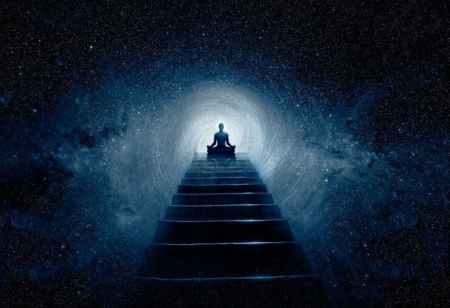
Enlightenment has been defined in various ways throughout human history, in many cultures, religions, ancient teachings, philosophies, and sciences.
Briefly, enlightenment is the awakening of the individual. It is the transition from adolescence, liberation from worldly conditions, to the spiritual maturity, to the state of perfection.
As designed; it is becoming a true 'human', an ascension, reaching one's own highest potential, self-discovery, a leap of comprehension.
If we look at the foundations of all definitions,
Enlightenment: is freeing oneself from being bound to certain social patterns, prejudices, and things learned from the environment in thinking and evaluation, and thus being able to entirely guide one's life with his own reasoning and intuition, living consciously about himself and the system.
In other words, it is the highest level of consciousness, a transition from darkness to light.
It is to comprehend the mysteries of existence and to live in accordance with the laws of nature.
For this, one must first know himself and be able to master himself.
Actually, the simplest definition is; to remember and reveal what we have forgotten. Because the word "insan" (human) is of Arabic origin and is formed by the combination of the words "üns" and "nisyan". "Üns" in Arabic means "closeness to Allah, establishing a connection," while "nisyan" means "forgetfulness." The word "insan" (human) thus conveys the meaning of "forgetful" or "one who forgets".
What a beautiful way to put both the question and its answer in a single word!
This is not an easy word as described. For this, one must go through all the stages within himself that humanity has gone through, and even further, he must experience a leap of comprehension.
It is just like the process of pregnancy and birth. The person gives birth to a new self.
It is a very long and arduous journey. For this reason, there is an ancient saying; "The bridge of the Hereafter is as thin as a strand of hair and as sharp as a sword.”
Enlightenment is also not a burden of knowledge. First, one must go through a process; the purification of his mind. He cleanses all of his false thinkings that he previously
learned, his judgments, beliefs, and then he opens a new page. He starts to fill it one by one with true knowledge.
This part is a person's greatest responsibility to himself; preparing a solid foundation with truth. But if one cannot go beyond this, then it only becomes the burden of knowledge, which then turns into a poison rather than a cure for human.
He finally reaches a point where he cannot go any further. He has learned everything he can, but still cannot live it. In other words, he knows but still cannot put it into practice.
This is the period for Mevlana Jalal-ud-din Rumi until he met Shams Tabrizi. Up until then, a person has done everything they could, put forth his intentions and prayers with all of his effort.
Beyond that, it is left to God’s will. If it is in a person's destiny, all the knowledge he knows begins to reflect in his existence, to manifest in his own being. He then experiences enlightenment, the expansion of understanding. They call this state as witnessing by directly experiencing the learned knowledge.
So what is the importance of enlightenment in human history?
Humanity has always been in search due to the feeling of deficiency and estrangement they have always felt somewhere in their journey of becoming 'human' for thousands of years.
By nature, despite how much power we have, how much we possess, we are always in a state of constant search due to the feeling of insufficiency and inadequacy, and this will continue in this way. Up until we come to a complete understanding of unity and wholeness.
Due to our animallike nature, we have gone through life chasing from one carrot to another to fill the void within. Our lives, the lives of our ancestors, the lives of billions of people who have come and gone from this world, have all been passing by.
Many methods and disciplines have emerged on this path: Shamanism, philosophy, Kabbalah, Sufism, Hinduism, Buddhism, many other ancient teachings and religions, etc.
All the masters and sages who have existed in every corner of the world throughout the history have always tried to convey the same thing in different languages:
"Why are we here?", "What is the purpose of existence?", "What is the meaning of life?", "Who are we?"
Although their methods and paths vary, the result they reached, the truth they told has always remained the same.
Finding answers to those questions is the reason for humanity's existence.
To remember and implement the forgotten truth is our only salvation from the dungeons we have created for ourselves.
Therefore, this issue is so important. Because this is the beginning of everything and the end of everything.

